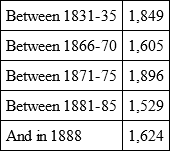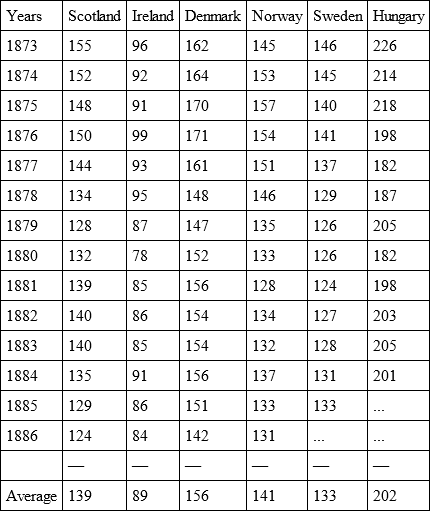 полная версия
полная версияWoman under socialism
The condition of the women is worst in the industrial branches in which they preponderate, for instance, the clothing and underwear industry, those branches, in general, in which work can be done at home. The inquiry into the condition of the working-women in the underwear and confectionery industries, ordered in 1886 by the Bundesrath, has revealed the fact that the wages of these working-women are often so miserable that they are compelled to prostitute their bodies for a side-source of income. A large number of the prostitutes are recruited from the strata of ill-paid working-women.
Our "Christian" Government, whose Christianity, as a rule, is looked for in vain there where it should be applied, and is found where the same is superfluous and harmful, – this Christian Government acts exactly like the Christian capitalists, a fact that does not astonish him who knows that the Christian Government is but the agent of our Christian capitalists. The Government only with difficulty decides in favor of laws to limit woman-labor to a normal measure, or to wholly forbid child-labor; – on the same principle that that Government denies many of its own employes both the requisite Sunday rest and normal hours of work, and in that way materially disturbs their family life. Post Office, railroad, penitentiary and other Government employes often must perform their functions far beyond the time limit, and their salaries stand in inverse ratio to their work. That, however, is, to-day, the normal condition of things, still considered quite in order by the majority.
Seeing, furthermore, that rent, in comparison to the wages and earnings of the workingmen, the lower Government employes and the small men included, is much too high, these must exert themselves to the utmost. Lodgers are taken into these homes, only males in some, females in others, often both. The young and the old live together in narrow quarters, without separating the sexes, and are crowded together even during the most private acts. How the sense of shame, or morality fares thereby, horrifying facts proclaim. The increasing brutalization of the youth, so extensively discussed, is due mainly to the conditions prevalent in our industrial system, with which the wretchedness of the home is closely connected. And, as to the children, what must be upon them the effect of industrial labor! The very worst imaginable, both physically and morally.
The ever increasing industrial occupation of married women also is accompanied with fatal results. Especially is this the case in connection with pregnancy and child-birth, as also during the early life of the child when it depends upon the nourishment of the mother. A number of ailments arise during pregnancy that affect destructively both the fruit and the organism of the woman, and cause premature and still-born births, upon all of which more later. After the child is born, the mother is compelled to return as quickly as possible to the factory, lest her place be taken by a competitor. The inevitable results to the little ones are: neglected care, improper or total lack of nourishment. They are drugged with opiates to keep them quiet. The further results are: a vast mortality, or stunted development; in short, the degeneration of the race. The children often grow up without having enjoyed true motherly and fatherly love, or having on their part, felt filial affection. Thus is the proletariat born, thus does it live and die. And the "Christian" Government, this "Christian" society wonders that rudeness, immorality and crime cumulate.
When, in the early sixties of last century, due to the American Civil War for the emancipation of the negroes, many thousands of workingmen in the English cotton industries were out of work, physicians made the remarkable discovery that, despite great want among the population, mortality among children had declined. The cause was simple. The children now enjoyed the mother's nourishment and better care than they had ever had during the best seasons of work. The same fact was attested by physicians during the crisis of the seventies in the United States, especially in New York and Massachusetts. The general lack of employment compelled the women to rest from labor, and left them time for the care of their children. Similar observations were also made by Dr. v. Recherberg during the inquiry into the condition of the weavers of the region of Zittau in Saxony, as shown by him in a work that he wrote during the summer of 1890.
In the home-industries, which romantic economists love to represent as idyllic, conditions are no better. Here the wife is chained to her husband, at work early and late into the night, and the children are from an early age hitched on. Crowded into the narrowest space imaginable, husband, wife and family, boys and girls, live together, along with the waste of materials, amidst the most disagreeable dusts and odors, and without the necessary cleanliness. The bedrooms are of a piece with the sitting and working rooms: generally dark holes and without ventilation, they would be sufficiently unsanitary if they housed but a part of the people huddled into them. In short, the conditions of these places are such as to cause the skin to creep of anyone accustomed to a life worthy of a human being.
The ever harder struggle for existence often also compels women and men to commit actions and tolerate indignities that, under other circumstances, would fill them with disgust. In 1877 it was authentically established in Munich that, among the prostitutes, registered by and under the surveillance of the police, there were not less than 203 wives of workingmen and artisans. And how many are not the married women, who, out of distress, prostitute themselves without submitting to a police control that deeply lacerates the sense of shame and dignity!
But we have wandered somewhat from our subject. It was shown that the number of actions for divorce is on the increase in all countries of civilization, and that the majority of these actions proceed from wives. This steadily rising figure of actions for divorce is a sign of the decay of bourgeois marriage, which is answering its purpose ever less. But a still much worse sign of its decay is the circumstance that, simultaneously, the number of marriages is in almost all these countries steadily on the decline. Experience tells that high prices for corn in one single year have an unfavorable effect both upon the number of marriages and that of births. Long industrial crises, and increasing deterioration of the general economic condition must, accordingly, have a lasting evil effect. This is confirmed by the statistics of marriages for almost all countries in civilization.
In France, marriages between 1881-1890 cast the following picture on the canvas. Marriages were contracted in —

There is, accordingly, a considerable decrease of marriages.
In the German Empire, the number of marriages was highest after the close of the war between Germany and France, during which they had stood still. In 1872 there were 423,900 marriages contracted, but in 1876 they numbered only 366,912, and during the worst year of the crisis, the year 1879, they dropped to 335,113. They have since risen again slowly, and numbered in

Although in the year 1892 the population of Germany was larger by 8,000,000 heads than in 1872, the number of marriages was not even as large as in 1874 when it amounted to 400,282. In the period between 1871-1880, there were, to an average of 1,000 inhabitants in Germany, 8.6 marriages; in the period between 1881-1888, only 7.8.
In Prussia, to the average 10,000 inhabitants, there married —

A similar, partly even more unfavorable picture than in Germany, is furnished by the statistical tables for other European countries.
Out of every 10,000 persons, there married —


These figures are interesting in more respects than one. In the first place, they prove that, in all the countries named, the number of marriages declines. Like Germany, all these countries show the highest frequency of marriage in the beginning of 1872, and then follows a drop in most of them. Hungary comes out best; Ireland, on the contrary, worst, showing the smallest figures of all. The ejectment of the Irish population from their lands, and the ever greater concentration of the same in the hands of the large landlords, express themselves clearly in the figures given.79
Industrial conditions have a marked effect upon the number of marriages. As the former has, on an average, become ever more unfavorable since the middle of the seventies, the decline in marriages is not astonishing. But not the industrial conditions only, also the manner in which the property relations develop affects marriages in a high degree, as just seen in Ireland. The Year-Book of Schmoller for 1885, section 1, gives information on the statistics of population of the Kingdom of Wuertemberg, from which it appears strikingly that with the increase of large age declines, while the number of unmarried men between the ages of 40 and 50 rises:

There can be no doubt: small landed property favors marriages: it makes a living possible for a larger number of families, although the living be modest. Large landed property, on the contrary, works directly against marriage, and promotes celibacy. All the figures here quoted prove, accordingly, that, not morals, but purely material causes are the determining factor. The number of marriages, like the moral conditions of a commonwealth, depends upon its material foundations.
The fear of want, the mental worry lest the children be not educated up to their station, – these are further causes that drive the wives, in particular, of all ranks to actions that are out of keeping with nature, and still more so with the criminal code. Under this head belong the various means for the prevention of pregnancy, or, when, despite all care, this does set in, then the removal of the unripe fruit —abortion. It were an error to claim that these measures are resorted to only by heedless, unconscionable women. Often, rather, it is conscientious women, who wish to limit the number of children, in order to escape the dilemma of either having to deny themselves their husbands, or of driving them to paths that they are naturally inclined to. It often is such women who prefer to undergo the dangers of abortion. Besides these, there are other women, especially in the higher walks of life, who, in order to conceal a "slip," or out of aversion for the inconveniences of pregnancy, of child-birth and of nursing, perhaps, out of fear of sooner losing their charms, and then forfeiting their standing with either husband or male friends, incur such criminal acts, and, for hard cash, find ready medical and midwife support.
To conclude from diverse indications, artificial abortion is coming ever more into practice; nor is the practice new. Artificial abortion was in frequent use among the ancient peoples, and is, to this day, from the most civilized down to the barbarous. According to Jules Roget,80 the women of Rome took recourse to abortion for several reasons: They either sought to destroy the evidence of illicit relations – a reason that even to-day is often at its bottom; or they wished to be able to indulge their excesses without interruption. There were also other reasons: they wished to avoid the changes that pregnancy and child-birth work upon woman's physique. Among the Romans, a woman was old from twenty-five years to thirty. Accordingly, she sought to avoid all that might impair her charms. In the Middle Ages, abortion was punishable with severe bodily chastisement, often even with death; the free woman, guilty thereof, became a serf. At present, abortion is especially in use in the United States. In all large cities of the Union, there are institutions in which girls and women are prematurely delivered: many American papers contain the advertisements of such places: abortion is talked of there almost as freely as of a regular birth. In Germany and Europe, opinion on the subject is different: the German criminal code, for instance, makes the act of both the principal and the accessory a penitentiary offense.81
Abortion is, in many cases, accompanied by the most serious results. The operation is dangerous; death not infrequently occurs; often the result is a permanent impairment of health. "The troubles of troublesome pregnancy and child-birth are infinitely less than the sufferings consequent upon artificial abortion."82 Barrenness is one of its most common consequences. All that, notwithstanding, abortion is practiced also in Germany, ever more frequently, and for the reasons given. Between 1882-1888, the number of cases in Berlin, of which the criminal courts took cognizance, rose 155 per cent. The chronique scandaleuse of the last years dealt frequently with cases of abortion, that caused great sensation, due to the circumstance that reputable physicians and women, prominent in society, played a role in them. Furthermore, to judge from the rising number of announcements in our newspapers, the institutions and places increase in which married and unmarried women of the property class are offered an opportunity to await the results of a "slip" in perfect secrecy.
The dread of a large increase of children – due to the smallness of means, and the cost of bringing up – has, among all classes and even peoples, developed the use of preventatives into a system, that here and yonder has grown into a public calamity. It is a generally known fact that, in all strata of French society, the "two-child system" is in force. In few countries of civilization are marriages relatively as numerous as in France, and in no country is the average number of children so small, and the increase of population so slow. The French capitalist, like the small-holder and allotment peasant, pursues the system; the French workingman follows suit. In many sections of Germany the special situation of the peasants seems to have led to similar conditions. We know a charming region in Southwest Germany, where, in the garden of every peasant, there stands the so-called "Sevenbaum," whose properties are applied to abortive purposes. In another district of the same country the regular two-child system prevails among the peasants: they do not wish to divide the places. Moreover, striking is the measure in which literature, that treats with and recommends the means of "facultative sterility," increases in Germany both in volume and demand, – of course, always under the colors of science, and in allusion to the alleged threatening danger of over-population.
Along with abortion and the artificial prevention of conception, crime plays its role. In France, the murder of children and their exposure is perceptibly on the increase, both promoted by the provision of the French civil code that forbids all inquiry after the paternity of the child. Section 340 of the Code Civil decrees: "La recherche de la paternite est interdite;" on the other hand, Section 314 provides: "La recherche de la maternite est admise." To inquire after the paternity of a child is forbidden, but is allowed after its maternity, – a law that glaringly brings out the injustice contemplated towards the seduced woman. The men of France are free to seduce as many women and girls as they are able to; they are free from all responsibility; they owe no support to the child. These provisions were instituted under the pretext that the female sex should be frightened against seducing the men. As you see, everywhere it is the weak man, this limb of the stronger sex, who is seduced, but never seduces. The result of Section 340 of the Code Civil was Section 312, which provides: "L'enfant conçu pendant le marriage a pour pere le mari."83 Inquiry after the paternity being forbidden, it is logical that the husband, crowned with horns, rest content with having the child, that his wife received from another, considered his own. Inconsistency, at any rate, can not be charged to the French capitalist class. All attempts to amend Section 340 have so far failed. Lately, February, 1895, the Socialist deputies in the French Chamber of Deputies presented a bill intended to put an end to the disfranchised position of the seduced or betrayed woman. Whether the attempt will be crowned with success is doubtful.
On the other hand, the French capitalist class – sensible of the cruelty it committed in so framing the law as to make it impossible for the deceived woman to turn for support to the father of her child – sought to make up for its sins by establishing foundling asylums. According to our famous "morals," there is no paternal feeling towards the illegitimate child; that exists only for "legitimate heirs." Through the foundlings' asylums the mother also is taken from the new-born child. According to the French fiction, foundlings are orphans. In this way, the French capitalist class has its illegitimate children brought up, at the expense of the State, as "children of the fatherland." A charming arrangement. In Germany, things bid fair to be switched on the French track. The provisions in the bill for a civil code for the German Empire contain maxims on the legal status of illegitimate children, strongly in contrast with the humane law still in force.
According to the bill, a dishonored girl – even if blameless, or seduced with the promise of subsequent marriage, or induced to consent to coition through some criminal act – has no claim against the seducer except as indemnity for the costs of delivery, and for support during the first six weeks after the birth of the child, and then only within the bounds of what is strictly necessary. Only in some of the cases of the worst crimes against morality, can a slight money indemnity be granted to the seduced girl, at the discretion of the court, and without the necessity of proving actual damages. The illegitimate child has no claim upon the seducer of his mother, except for the merest necessaries of life, and then only until its fourteenth year. All claims of the child on its father are, however, barred if, within pregnancy, any other man cohabit with its mother. The plaintiff child has, moreover, to prove that its mother has not accepted the embraces of any other man.
Menger, the expositions in whose treatise84 we here follow, justly raises against the bill the serious charge that it only accrues to the advantage of the well-to-do, immoral men, seducers of ignorant girls, often girls who sin through poverty, but leaves these fallen girls, together with their wholly guiltless children, entirely unprotected, aye, pushes them only deeper into misery and crime. Menger cites, in this connection, the provisions of the Prussian law. According thereto, an unmarried woman or widow of good character, who is made pregnant, is to be indemnified by the man according to his means. The indemnity shall, however, not exceed one-fourth of his property. An illegitimate child has a claim upon its father for support and education, regardless of whether his mother is a person of good character: the expenditure, however, shall be no higher than the education of a legitimate child would cost to people of the peasant or of ordinary citizen walks of life. If the illicit intercourse occurred under promise of future marriage, then, according to the further provisions of Prussian law, the Judge is duly to award the woman, pronounced innocent and a wife, the name, standing and rank of the man, together with all the rights of a divorced woman. The illegitimate child has, in such cases, all the rights of children born in wedlock. We may await with curiosity to see whether the provisions of this bill, so hostile to woman, will acquire the force of a civil code of law in Germany. But retrogression is the key-note in our legislation.
Between the years of 1830-1880, there were 8,563 cases of infanticide before the French court of assizes, the figures rising from 471 in 1831, to 980 in 1880. During the same period, 1,032 cases of abortion were tried, 41 in 1831, and in 1880 over 100. Of course, only a small part of the abortions came to the knowledge of the criminal court; as a rule, only when followed by serious illness or death. In the cases of infanticide, the country population contributed 75 per cent., in the cases of abortion the cities 65 per cent. In the city, the women have more means at command to prevent normal birth; hence, the many cases of abortion and the small number of infanticides. It is the reverse in the country.
Such is the composition of the picture presented by modern society in respect to its most intimate relations. The picture differs wide from that that poets and poetically doused phantasists love to paint it. Our picture, however, has this advantage, – it is true. And yet the picture still calls for several strokes of the brush to bring out its character in full.
In general, there can be no difference of opinion touching the present and average mental inferiority of the female sex to the male. True enough, Balzac, by no means a woman-lover, claims: "The woman, who has received a male education, possesses in fact the most brilliant and fruitful qualities for the building of her own happiness and that of her husband;" and Goethe, who knew well both the men and women of his times, expresses himself in Wilhelm Meister's Apprenticeship (confessions of a pure soul): "Learned women were ridiculed, and also the educated ones were disliked, probably because it was considered impolite to put so many ignorant men to shame." We agree with both. Nevertheless, the fact is no wise altered that, in general, women stand intellectually behind the men. This difference is compulsory, because woman is that which man, as her master, has made her. The education of woman, more so than that of the working class, has been neglected since time immemorial; nor are latter-day improvements adequate. We live in days when the aspiration after exchange of thought grows in all circles, in the family also; and there the neglected education of woman is felt as a serious fault, and it avenges itself upon the husband.
The object of the education of man – at least it is so claimed, although due to the mistaken methods, the object is often missed, perchance, also, is not meant to be reached – aims at the development of the intellect, the sharpening of the powers of thought, the broadening of the field of practical knowledge, and the invigoration of the will-power, in short, at the cultivation of the functions of the mind. With woman, on the contrary, education, so far as at all attended to in a higher degree, is mainly aimed at the intensification of her feelings, at formality and polite culture – music, belles-letters, art, poetry – all of which only screw her nervous sensitiveness and phantasy up to a higher pitch. This is a mistaken and unhealthy policy. In it the fact transpires that the powers, which determine the measure of woman's education, are guided only by their ingrained prejudices regarding the nature of the female character, and also by the cramped position of woman. The object must not be to develop still further the sentimental and imaginative side of woman, which would only tend to heighten her natural inclination to nervousness; neither should her education be limited to etiquette and polite literature. The object, with regard to her as to man, should be to develop their intellectual activity and acquaint them with the phenomena of practical life. It would be of greatest benefit to both sexes if, in lieu of a superfluity of sentiment, that often becomes positively uncanny, woman possessed a good share of sharpened wit and power for exact reasoning; if, in lieu of excessive nervous excitation and timidity, she possessed firmness of character and physical courage; in lieu of conventional, literary refinement, in so far as she at all has any, she had a knowledge of the world, of men and of the powers of Nature.



